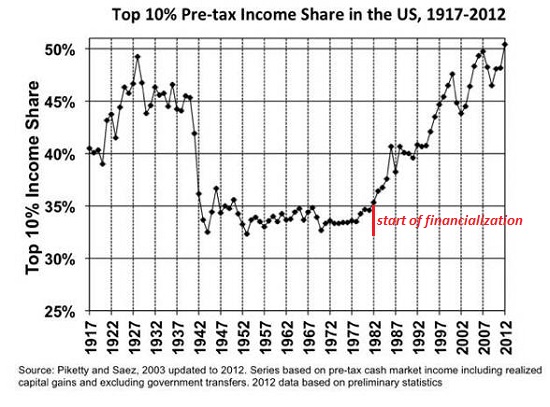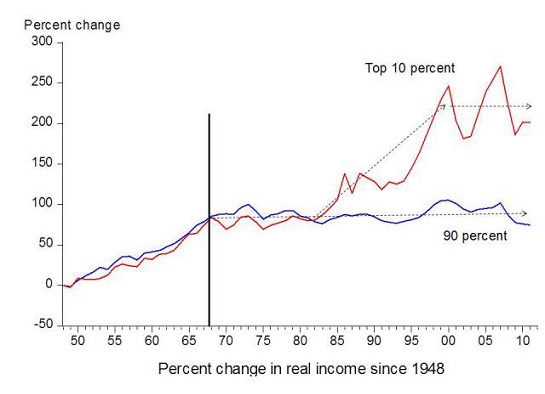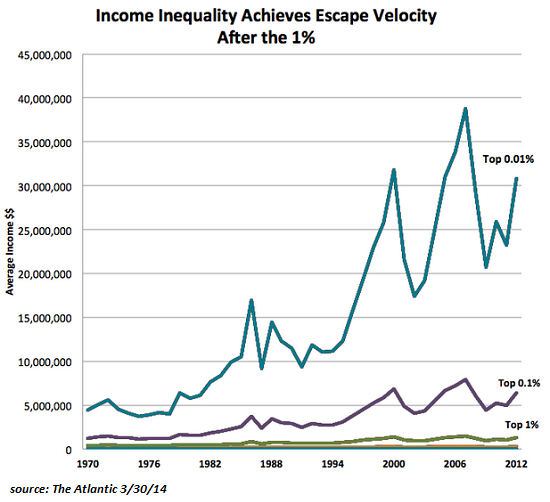A Critique of Piketty's Solution to Widening Wealth Inequality
The real problem with Piketty's taxation/social welfare solution to wealth inequality is that it does nothing to change the source of systemic inequality, debt-based neofeudalism and neocolonialism.
Those of us concerned by widening wealth/income inequality have been following the work of Thomas Piketty and Emmanuel Saez for many years. I've cited their analysis many times; for example: Two Americas: The Gap Between the Top 5% and the Bottom 95% Widens (August 18, 2010).
Thomas Piketty has taken his meticulous research and turned it into a book, Capital in the Twenty-First Century, that has catalyzed the discussion of widening inequality by essentially proving that capital expands at rates far above the overall economy and wages. Since capital grows much faster than wages or the underlying economy, the gap between earned income and unearned income (rents) widens, along with the net worth of those who own capital and those who own little to no capital.
Here is a chart from his work with Saez, showing how the top 10% has pulled away from the bottom 90%:

This chart shows how the income of the bottom 90% has been stagnant for 40 years:

This chart shows how capital's growth rate causes the very top layer of owners of capital to outpace their less-wealthy peers: the top 10% have outpaced the bottom 90%, the top 1% has outpaced the top 10%, the top .1% has outpaced the 1%, and the top .01% has outpaced the .1%.

As other reviewers have noted, Piketty's book is not a theoretical critique of capitalism, it is a data-driven exploration of how present-day capitalism drives wealth inequality. Piketty's solution to widening inequality is a global wealth tax, a solution he characterizes as utopian, for getting the world's nations to eradicate tax havens is close to impossible.
I would go further and say it is impossible within the U.S., never mind the world, as the top .1% own the political machinery. Why would anyone who owns the political process agree to tax themselves?
As a result, any wealth tax will fall not on the super-wealthy with billions of dollars of unearned rentier income but on the upper-middle class who worked, saved and invested to build a nestegg. In other words, a wealth tax will fall on the same tax donkeys who are already paying the majority of income taxes.
If I have contributed anything to the wealth inequality issue, it is the proposition that we live in a neofeudal, neocolonial economy (the New Feudalism), ruled by a New Nobility. In my analysis, neofeudalism arises from these characteristics:
1. Debt is the enforcement mechanism of feudal fealty. Debtors--those with mortgages, student loans, vehicle loans, credit card balances, etc.--are obligated to fund the rentier income of their financial masters, the New Nobility. This is the essence of a feudal arrangement.
Others have different definitions of neofeudalism.
In my analysis, the rise of neofeudalism is a direct consequence of the financialization of the economy, in which essential assets (homes, for example) and processes are commoditized into financial instruments that can be sold, leveraged, pyramided and traded globally. Once an asset or process has been commoditized, it loses all connection to individuals, communities, companies or nations: it is the perfection ofrootless capital, free to be bought and sold anywhere, any time, with no connection to the real world other than a chain of claims.
2. Society and the economy are organized so only the wealthy do not need to go into debt, which is serfdom in a neofeudal arrangement. The illusion of choice is thus maintained, a sibling of the illusion of democracy in which both party candidates are in thrall to the New Nobility.
The fiendishly Orwellian brilliance of neofedualism is this: present-day serfs opt into serfdom, just as free citizens opted into the protection of feudal lords' estates as the Roman Empire crumbled around them. It was a false choice; remain free and face ruinous taxes, or choose serfdom on a lord's estate. The present economy offers an equivalent false choice for all but the most dedicated, disciplined few who reject debt by rejecting consumerism, "growth" and the endless spew of neofeudal propaganda.
Want a college education? You freely choose the servitude of debt.
Want a house? You freely choose the servitude of debt.
Want a new vehicle? You freely choose the servitude of debt.
Neocolonialism is tightly bound to neofeudalism in my model.
3. The essence of neocolonialism is the "company store," which extends credit that can never be paid off as wages are stagnant. In a neocolonial economy in which only the top Caste of Managers, Technocrats and Professionals (the top 10%) can expand their income and wealth, debt-serfs are impoverished by servicing debt. As the real (inflation-adjusted) incomes of the bottom 90% decline or stagnate, debt service consumes an increasing amount of disposable earned income.
Debt service is guaranteed in the neocolonial model. In the old colonial model, marginalized populations were recruited to work on plantations with the false promise of wages, which never quite exceed the cost of servicing debt.
This arrangement was much neater than slavery, as the marginalized need not be bought: they freely choose their servitude. Beneath this supposed free will is of course a false choice: there is no other way to earn cash income other than working on the debt-plantation.
In the old colonial model, only those ethnicities with an iron passion for saving regardless of income (for example, the Chinese, among others), were able to accumulate enough capital to escape the debt-bondage and establish small businesses.
I explain the basic structure of neofeudalism and the neocolonialism in The E.U., Neofeudalism and the Neocolonial-Financialization Model (May 24, 2012)
The problem with Piketty's solution to the intrinsic inequalities created by financialization, neofeudalism and neocolonialism is the super-wealthy might well agree to tax those beneath them, just to prop up the arrangement that benefits them so mightily. I can easily foresee a political movement, secretly funded by the New Nobility, that taxes all wealth above $1 million, but which magically excludes wealth-holders that just happen to be the top .1%.
The New Nobility might even agree to pay a modest wealth tax, which would fund millions more recipients of food stamps, Section 8 housing and other social welfare, in effect institutionalizing neofeudalism and neocolonialism by rendering the unemployed complicit in the arrangement.
If you owned $100 million, and were earning $5 million in rentier income annually, wouldn't you agree to a $1 million tax to fund social welfare programs that kept the rabble sedated with bread and circuses? It's a no-brainer.
The real problem with Piketty's taxation/social welfare solution to wealth inequality is that it does nothing to change the source of systemic inequality, debt-based neofeudalism and neocolonialism. Simply raising more taxes to fund more social welfare programs leaves the unjust, rapacious, and ultimately destabilizing Status Quo entirely intact.
I have laid out another path in my books: refuse serfdom, abandon participation in neofeudalism and neocolonialism, and build parallel systems of cooperation and wealth-building that are not debt-dependent.
Want to give an enduringly practical graduation gift? Then give my new book Get a Job, Build a Real Career and Defy a Bewildering Economy, a mere $9.95 for the Kindle ebook edition and $17.76 for the print edition.
Join me on May 2 for the Sonoma Wine Country Conference: Investment Ideas Hidden In Plain Sight: great speakers, good cause (benefits Autism Society of America):
 <
<Get a Job, Build a Real Career and Defy a Bewildering Economy(Kindle, $9.95)(print, $20)

Are you like me? Ever since my first summer job decades ago, I've been chasing financial security. Not win-the-lottery, Bill Gates riches (although it would be nice!), but simply a feeling of financial control. I want my financial worries to if not disappear at least be manageable and comprehensible.
And like most of you, the way I've moved toward my goal has always hinged not just on having a job but a career.
You don't have to be a financial blogger to know that "having a job" and "having a career" do not mean the same thing today as they did when I first started swinging a hammer for a paycheck.
Even the basic concept "getting a job" has changed so radically that jobs--getting and keeping them, and the perceived lack of them--is the number one financial topic among friends, family and for that matter, complete strangers.
So I sat down and wrote this book: Get a Job, Build a Real Career and Defy a Bewildering Economy.
It details everything I've verified about employment and the economy, and lays out an action plan to get you employed.
I am proud of this book. It is the culmination of both my practical work experiences and my financial analysis, and it is a useful, practical, and clarifying read.
Test drive the first section and see for yourself. Kindle, $9.95 print, $20
"I want to thank you for creating your book Get a Job, Build a Real Career and Defy a Bewildering Economy. It is rare to find a person with a mind like yours, who can take a holistic systems view of things without being captured by specific perspectives or agendas. Your contribution to humanity is much appreciated."
Laura Y.
| Thank you, Ray W. ($50), for your magnificently generous contribution to this site -- I am greatly honored by your steadfast support and readership. | Thank you, Randy W. ($50), for your outstandingly generous contribution to this site -- I am greatly honored by your support and readership. |


























